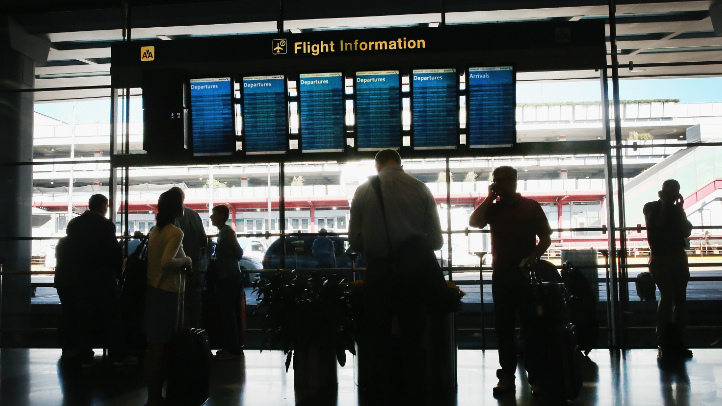
Chicagoans cast their ballots to choose Chicago's 57th mayor earlier this week as Brandon Johnson and Paul Vallas both campaigned on messages of change following a tumultuous four years in Chicago, accented by the COVID-19 pandemic.
While property taxes, transit reliability and education were commonly discussed in mayoral forums and identified as important issues, Chicago voters largely pointed to crime as their most significant concern in the 2023 election.
In the wake of the pandemic, Chicago saw a meteoric rise in shootings and homicides, culminating in the city's most violent year since the 1990s in 2021.
While shootings and homicides have since decreased in Chicago, both metrics remain well above 2019 levels, the most recent full year prior to the pandemic.
Feeling out of the loop? We'll catch you up on the Chicago news you need to know. Sign up for the weekly Chicago Catch-Up newsletter here.
Though Johnson and Vallas are both Democrats, their messages on public safety highlighted a stark difference that voters were left to choose from in the runoff election, as well as a significant contrast between two wings of the party.
Vallas, the former Chicago Public Schools CEO who had the backing of Chicago's Fraternal Order of Police and much of the city's business community, emphatically campaigned on filling police vacancies, recruiting retired officers back to the department and establishing a city-operated witness protection program.
Notably, Vallas also campaigned on restoring a community policing strategy while adding significant law enforcement presence to the CTA.
Local
Cook County Commissioner Brandon Johnson, who had the backing of the Chicago Teachers Union and many progressive activists, campaigned on tackling crime by addressing the "root causes" that create conditions leading to young people committing crime.
Johnson had been repeatedly criticized by Vallas on the campaign trail for calling defunding the police "a political goal", and was notably the only one of the nine first-round candidates to not explicitly commit to filling the Chicago Police Department's vacancies.
In the runoff campaign, Johnson distanced himself from past comments on defunding the police and said he would seek to fill vacancies, while emphasizing an approach that would identify and tackle root causes in crime.
Johnson specifically advocated for mental health professionals to respond to mental health crises, while advocating for the promotion of 200 new detectives in an effort to improve the city's low homicide clearance rate.
While Vallas argued his support from rank-and-file officers and endorsement from the Fraternal Order of Police made him best suited to move the CPD to compliance with a federal consent decree, Johnson heavily criticized Vallas' endorsement from the union while campaigning on a reform-minded message.
Johnson pushed for reopening shuttered mental health clinics on the campaign trail, while identifying investing in youth employment as a step to reduce crime.
While Chicagoans across the city identified crime as an issue paramount to their decision on who to vote for, residents who live in neighborhoods most impacted by violent crime voted much differently from residents in areas with the lowest reported crime in the city.
The below map shows how each precinct and ward voted in Tuesday's election, with the vote counts in the map reflecting totals posted by the Chicago Board of Elections on Wednesday morning, therefore not including some mail-in ballots.
Current vote totals can be found here.
All seven Chicago community areas that have seen five or more homicides thus far in 2023 voted overwhelmingly in favor of Johnson, with his comfortable margins in neighborhoods such as Chatham and his home community area of Austin paramount to his victory.
In the city's 6th Ward, consisting mostly of Chatham and represented in City Council by former mayoral candidate Roderick Sawyer, Johnson received over 80% of the ward's 10,930 votes.
Chatham currently has seen 13 homicides in 2023, the most of any community area. There were 26 homicides reported in the community area in 2022, the eighth-most of Chicago's 77 community areas.
Sawyer, who finished last out of the first round's nine candidates on the ballot, endorsed Vallas in the runoff election.
Vallas also received an 11th-hour endorsement from 4th Ward Ald. and former mayoral candidate Sophia King, who also backed the former CPS CEO's public safety message.
King also made public safety a large part of her mayoral platform, and sees the issue as pivotal to her ward that contains both parts of downtown and higher-crime areas of the city's South Side.
Despite Vallas' backing, Johnson won the 4th Ward in a landslide, carrying over 72% of the vote.
Of the following 10 community areas that saw the highest number of homicides in 2022, Vallas carried precincts in just one, New City.
- Austin
- South Shore
- Auburn Gresham
- West Englewood
- West Garfield Park
- North Lawndale
- Roseland
- Chatham
- New City
- West Pullman
New City is better-known to Chicagoans as home of the Back of the Yards neighborhood, while also containing the still predominantly-white Canaryville neighborhood, providing Vallas a strong base of support just south of Guaranteed Rate Field.
Despite Johnson's successes across the aforementioned areas, many of their corresponding alderpersons had endorsed Vallas in the runoff election, particularly praising his approach to public safety.
Of the eight wards that Johnson carried 80% or more of the vote in, Vallas had received the endorsement of four of those City Council members.
- 6th Ward, Roderick Sawyer (Chatham, Greater Grand Crossing)
- 8th Ward, Michelle Harris (Avalon Park, Burnside, Calumet Heights)
- 17th Ward, David Moore (Auburn Gresham, West Englewood, Chicago Lawn)
- 37th Ward, Emma Mitts (Austin, Humboldt Park)
Conversely, Vallas ran up his highest margins in Chicago's community areas least affected by violent crime.
According to the Chicago Tribune, 11 of Chicago's 77 community areas did not record a homicide in 2022.
- Mount Greenwood
- Jefferson Park
- Norwood Park
- O'Hare
- West Elsdon
- Hegewisch
- Garfield Ridge
- Clearing
- North Center
- Oakland
- Forest Glen
Vallas won every precinct in eight of the 11 aforementioned community areas, while being the top vote-getter in 10 of the 11 areas. Oakland, the city's smallest community area located along the southern lakefront, was the lone exception.
It was these areas where Johnson also struggled the most, as the Cook County Commissioner took the largest individual precinct losses in the election in the city's Mount Greenwood community area.
In the city's 19th Ward, which contains all of Mount Greenwood but also parts of neighboring Beverly and Morgan Park, Johnson failed to carry just 5% of the vote in 5 of the ward's 36 precincts.
In 13 of the ward's 36 precincts, Johnson carried less than 10% of the vote.
Johnson faced similar struggles in the city's 41st Ward (O'Hare, Edison Park) and the 38th Ward (Dunning, Portage Park), the former of which being the most lopsided ward toward any candidate of the race, with Vallas carrying just under 87% of the vote there.
Although public safety was a primary concern for many Chicago voters and played a significant role into the decisions voters made toward both candidates, the splintered results of the election's first round in February show that many residents likely voted for a candidate they didn't feel wholly aligned with.
In the February election, incumbent Mayor Lori Lightfoot won pluralities in 16 of the city's 50 wards, with Congressman Chuy García winning 6 wards in the first round.
Lightfoot ultimately did not make an endorsement in the race, making her the lone first-round candidate to not weigh in. Johnson won all 16 of the wards Lightfoot carried in the first round, many by a significant majority.
García endorsed Johnson in the runoff election, saying the "choice is clear" while emphasizing that he and Johnson share the same "progressive values."
While Vallas carried 4 of the 6 wards García won in the first round, it's hard to argue García's endorsement was without impact, particularly seen in Johnson's victory in García's home ward, the 22nd.
Education also loomed especially large in the runoff campaign, with Vallas' past in leadership positions of school districts in Philadelphia, New Orleans and Bridgeport, Conn. both lauded by his own campaign and heavily scrutinized by Johnson's.
Vallas' advocacy for charter schools was vehemently opposed by Johnson, a line of attack that was accented after a political action committee associated with former Secretary of Education Betsy DeVos donated to Vallas' campaign.
Voters who were closely tied to their party affiliation were also likely to be impacted by a line of attack that persisted since the first round from several opponents: that Vallas was a Democrat in name only.
Resurfaced quotes and social media posts and likes from Vallas were used as fodder for Johnson's campaign, particularly repeating older quotes from the former CPS CEO that insinuated he was "more of a Republican than a Democrat" and that he was "fundamentally opposed to abortion."
While Vallas consistently called himself a "lifelong Democrat" in his campaign messaging and signaled support for abortion rights and LGBTQ+ rights on the campaign trail, his past quote on abortion and appearance at an event held by Awake Illinois, a right-wing group, over the summer were consistently surfaced by Johnson's campaign.
Vallas' campaign consistently used public safety as the most visible message, and appeared to avoid attacking Johnson early on in the runoff campaign, initially avoiding attack ads and not responding to attacks in the first mayoral forum of the runoff on NBC 5.
His campaign took a sharp turn to the offense by the middle of March, likely in response to polling that showed the race was quickly tightening after a 1983 Labs poll at the beginning of the runoff campaign initially showed Vallas with an 11-point lead.
The former CEO was more responsive to attacks from Johnson in the remaining forums, while releasing attack ads blasting Johnson's tax plan and positions on public safety.
Johnson's narrow victory was reached by expanding his first round coalition of the far north lakefront and Milwaukee Avenue corridor to the South and West Sides, where his dominance across the board left Vallas little margin for error elsewhere.
Higher turnout among young voters in the runoff compared to the first round was also paramount to Johnson's victory, with election night data showing over 17,000 more voters ages 25-34 voted in the runoff than in February's general elections. This helped offset Vallas' advantage among the higher-turnout, older demographic.
Public safety and crime were identified as primary concerns from many Chicagoans who voted for either candidate, with concerns since the onset of the COVID-19 pandemic and subsequent rise in violent crime making it a much larger issue than it was in the 2019 mayoral election.
However, with a plethora of pressing issues such as transportation, cost of living, police reform and education also identified as contributing factors into voters' decisions, it would be misguided to see Johnson's election as a referendum on public safety policy on the national stage.



